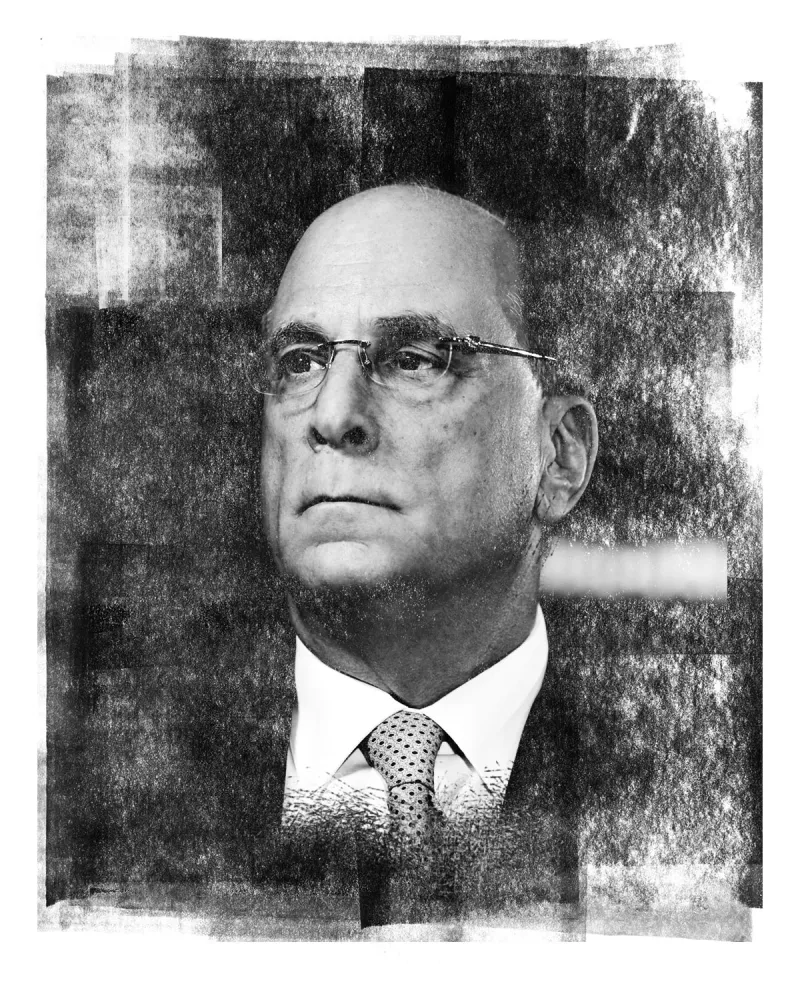
Larry Fink
(II illustration; Stefan Wermuth/Bloomberg)
Larry Fink started this year with a rallying cry. In his much-anticipated annual letter, published in January, Fink told CEOs of companies in which BlackRock is invested that climate change is now a major investment risk — and declared that BlackRock would make sustainability a factor in all its investments.
Climate change, said BlackRock’s chairman and CEO, was defining the future of every business and would prompt a massive movement of global capital. The head of the world’s largest asset manager — whose fortunes are intertwined with markets — made a bold case that climate change will reshape finance altogether.
“From my 20-plus meetings with clients a week, where climate change is a consistent theme they ask about, it became very clear to me that markets were beginning to price climate change as an investment risk,” says Fink, speaking with Institutional Investor this week ahead of his keynote appearance at the first-ever Institutional Investor Festival on Thursday. “I think people will look back in 2021 and find that those companies that are not focusing on climate change and how it impacts their company will trade at a lower and lower P/E, and companies that are front-footed and focused on it will be trading at higher P/Es.”
Of course, Fink published his letter on climate change before the calamitous events of 2020 unfolded — with the spread of the coronavirus shutting down global economies, the killing of George Floyd by a police officer sparking a reckoning around racial injustice in the U.S. and abroad, and governments launching unprecedented interventions to try to save their economies from the pandemic.
Fink found himself at the center of every one of these maelstroms. That’s because, at $7.8 trillion in assets, BlackRock manages more money than any of its rivals — making Fink arguably the most powerful, influential investor in the world.
But Fink isn’t a formidable leader just because BlackRock is big. He took aggressive stances this year and pushed the industry forward on controversial issues, forcing every other asset manager to consider its positions and what actions to take. For those reasons, Fink was the obvious choice for II’s inaugural award for Institutional Investor of the Year, which recognizes the individual who has most prominently set the agenda and provided leadership for the industry.
Fink’s outsize influence on financial markets in 2020 can be seen directly in the Federal Reserve’s decision in March to turn to BlackRock when it needed help stabilizing corporate bond markets. The Fed hired BlackRock’s advisory arm to advise on and purchase corporate bonds, including commercial mortgage-backed securities, syndicated loans, investment-grade bonds, and exchange-traded funds containing corporates. Five other governments, including the Bank of Canada and the European Commission, also hired BlackRock during the pandemic.
Though some criticized the Fed’s choice, few firms apart from BlackRock had the technology and capabilities to pull it off. In addition, the firm is now the largest sponsor of ETFs and has spent years developing bond products. Institutions now routinely use ETFs to get around plumbing problems in the primary bond markets — something that helped alleviate pressure as markets gyrated in March.
In June, Fink made his own bold pledge. In just four years, he said, BlackRock would double the representation of Black people in senior management and increase the firmwide presence of African Americans by 30 percent. Right now only 3 percent of employees at the director level and above and 5 percent of all employees are Black.
“The biggest epiphany with George Floyd was this: I was mad at myself for not pushing the agenda we had to build a diverse firm fast enough,” Fink tells II. “We had a commitment, but we weren’t fulfilling the commitment as fast as we should have. I said we have to be much more focused and intense. We have to move forward now.”
The firm also said it would look to do business with more Black- and Latinx-owned firms, including brokerage firms, third-party vendors, and asset managers that it hires for its fund-of-funds programs. It would call for better reporting about workforce diversity from the companies it invests in. (The Sustainability Accounting Standards Board’s disclosure standards, which BlackRock in January called on CEOs to adhere to, actually include information on the racial and ethnic characteristics of U.S. workforces.)
BlackRock’s call for more information could push companies to provide the first true profiles of their employees, including gender, ethnic, and racial backgrounds. And with the effects of Covid disproportionately affecting communities of color, Fink vowed to track the progress on diversity once the world returns to normal.
“This fall, as we assess the impact of companies’ response to Covid-19 and associated issues of racial equality, our stewardship team will be refreshing our expectations for human capital management and how companies pursue sustainable social practices more broadly,” Fink wrote in a June letter.
It wasn’t the first time the firm used such tools to help solve a crisis. In 1994, BlackRock advised General Electric on what to do with Kidder Peabody’s $7 billion portfolio amid a bond trading scandal, and in 2008 it counseled banks, competitors, and governments on the mortgage securities that no other firm had the tools to value.
Fink’s leadership in 2020 can be traced back to the firm’s founding. Fink has been at the center of some of the biggest changes on Wall Street over the past four decades. While at First Boston in the 1980s, he helped create the mortgage-backed security and other securitization products, which are noted for lowering the cost of credit and expanding home ownership. In 1988, Fink and his co-founders set up the firm that would become BlackRock, using risk tools that hadn’t been available to investors before.
These tools eventually evolved into the firm’s Aladdin portfolio and risk management system, which is now used by competitors, pension funds, banks, and arms of the government. Aladdin gives users a comprehensive picture of the risks of everything in an investment portfolio.
And those risks were almost too numerous to count this year. From his perch at BlackRock, Fink will almost certainly continue to be at the forefront of solving the most urgent crises the world’s investors face.
Which brings him back to climate change. In his January letter, Fink drew an easy-to-understand picture of the investment risks. The municipal bond market will likely need to be reimagined, as cities must rebuild bridges and roads to withstand new weather patterns or construct new ones as people move away from hard-hit regions. The 30-year mortgage, meanwhile, will come under stress as bankers struggle to understand new risks that could appear decades out.
At the time, Fink made a number of hard pledges, including making sustainability part of his firm’s portfolio construction and risk management process; getting out of investments like coal producers; and telling shareholders, clients, communities, regulators, and others exactly what the firm is doing when it comes to sustainability. He hasn’t eased up on those promises.
“We’re now recognizing the real severity of what climate change can be, and we’re seeing the physical impact of that everywhere,” notes Fink. “As that becomes more and more recognized, we’ll see a huge reallocation of capital. Covid is only accelerating that view. That’s because Covid was an existential risk to health — just like climate change is an existential risk to existence.”





